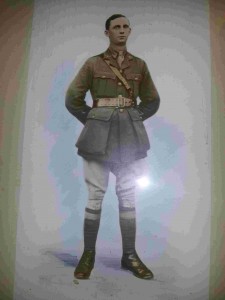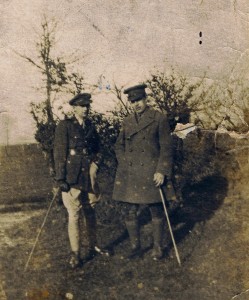Pinpoint Ancestry
Bringing your family's past to life
A missing ancestor
The First World War has always fascinated me – not only because of the tragic loss of human life – but also because my paternal grandfather enlisted in October 1914 and managed to survive the entirety of the conflict.
A missing family member often provides the catalyst for fascination and a desire to find out more about them. And this was certainly the case for me as my grandfather John Capper died six years before I was born. I had photographs to look at, his war medals to cherish and his grave to visit – what I didn’t have was his first hand account of his life.
Why did the youngest son of a farmer from North Wales feel the need to enlist at the start of the conflict? Conscription wasn’t enforced until 1916, so what was his incentive? His grandfather had visited France in the 1860s to deal with the estate of his elder sister – the family still talks about this trip. Did my grandfather want to visit France for this reason? Was he compelled to do his duty to King and country and fight for freedom? Or did he merely wish to go on what he thought would be an adventure that would be over by Christmas? No one could answer that question apart from him and unfortunately it was too late to ask.
I obtained his attestation papers from the National Archives in London – I was lucky, although he had enlisted as a Private with the Cheshire Yeomanry, he was promoted in the field and became a 2nd Lieutenant in the Loyal North Lancashire Regiment. As a result his documents were available for research. The majority of attestation papers were destroyed in the Second War and are known as the ‘Burnt Collection’. Very few remain, but there is a substantial collection for Officers.
So I have been able to read the official version of his war service which has been a bonus, but of course it doesn’t contain his own testimony of his experiences during that time. I am by no means unique in this respect, many people researching their families will be in the same situation. At least I have been able to obtain records about my grandfather, and war diaries that will help me construct in my own mind what his life was like on the battlefields of France. There are also living family members who remember him well but these are becoming fewer with every year that passes.

John Capper 1917
I have researched many families in the course of my work and always pause when I see a generation of sons born in the 1880s and 1890s – knowing that inevitably some of them will have enlisted as my grandfather did. And so, if I discover that they were involved in the conflict I always note it. These men deserve to be remembered even if they didn’t marry and leave children who would one day wonder what they were like.
+ Contact Information
Kathryn Burtinshaw M.Sc., Q.G
Pinpoint Ancestry
9 Spring Gardens,
Rhosddu,
Wrexham,
LL11 2NX
United Kingdom
Tel: 07576115513
+ Contact Information
Kathryn Burtinshaw M.Sc., Q.G.
Pinpoint Ancestry
9 Spring Gardens,
Rhosddu,
Wrexham,
LL11 2NX
United Kingdom
Copyright (c) 2023 Pinpoint Ancestry. All rights reserved.










